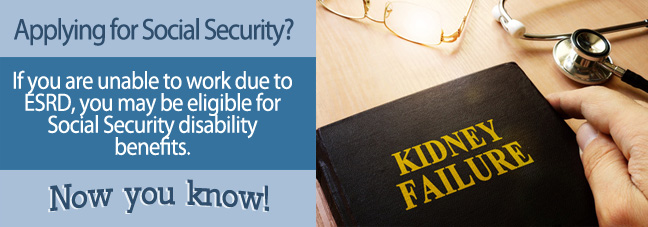End-stage renal disease (ESRD) is another name for kidney failure. It is usually caused by chronic kidney disease and is accompanied by debilitating symptoms such as muscle cramps, swelling in your feet and ankles, and trouble catching your breath.
Eventually you will need a kidney transplant, which is a serious and life-changing treatment. For this reason, you may be eligible for Social Security Administration (SSA) disability benefits. If you are over 50, application of the SSA grid rules can maximize your chances of approval.
Grid Rules and ESRD
The SSA grid rules evaluate your ability to do certain types of work while taking into account that if you are over 50, your chances of being hired for an entry-level position in a different field are limited, as are the transferrable skills you may have. Criteria taken into account include:
- Your age
- Amount of education you received
- The skills acquired in your previous occupations
- Whether you can use those skills in a new job
- The amount and intensity of physical work you can do
Claimants who are over 50 may still receive benefits even when they are physically capable of doing a different job, as their opportunities for entry-level jobs and adaptability are lower than those of younger workers.

What Type of Work Can Someone Do With This Condition?
ESRD has a variety of painful symptoms that include muscle cramps, nausea, weakness in the legs, and swollen feet and ankles. Sustained mobility may be impossible, which makes it difficult for you to keep working if your job requires you to keep active.
If you are a 51-year-old landscaper who did not graduate from high school, your chances of finding alternative employment are lower because employers aren’t as quick to hire older workers and your skills are not transferrable to a more sedentary occupation.
As a result, you may be approved for benefits even if your grid results indicate that you can do other jobs.
Meeting a Blue Book Listing
The SSA relies on the Blue Book, which is its manual of disabling conditions, when determining whether an applicant is disabled. ESRD appears several times in Section 6.00—Genitourinary Disorders.
If you require a kidney transplant and / or your symptoms are expected to last at least 12 months or end in death, the SSA will find you disabled and approve your application for benefits.
If you have been diagnosed with ESRD and want to apply for benefits, a Social Security Disability attorney or advocate can provide invaluable assistance. They understand SSA expectations for claim submittal and can make the application on your behalf, minimizing the risk of a mistake and subsequent claim rejection.
They will communicate with the SSA on your behalf if questions arise and help you file an appeal should your claim initially be denied (which happens in the majority of cases).
Professional support and advice can make a huge difference between claim acceptance and initial rejection, and when it comes to getting the benefits you need, you deserve every advantage.